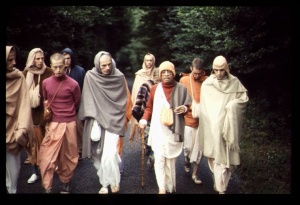CC Madhya 13.23: Difference between revisions
m (1 revision(s)) |
(Vanibot #0054 edit - transform synonyms into clickable links, which search similar occurrences) |
||
| (One intermediate revision by one other user not shown) | |||
| Line 1: | Line 1: | ||
{{ | [[Category:Sri Caitanya-caritamrta - Madhya-lila Chapter 13|C023]] | ||
<div style="float:left">'''[[Sri Caitanya-caritamrta|Śrī Caitanya-caritāmṛta]] - [[CC Madhya|Madhya-līlā]] - [[CC Madhya 13|Chapter 13: The Ecstatic Dancing of the Lord at Ratha-yātrā]]'''</div> | |||
<div style="float:right">[[File:Go-previous.png|link=CC Madhya 13.22|Madhya-līlā 13.22]] '''[[CC Madhya 13.22|Madhya-līlā 13.22]] - [[CC Madhya 13.24|Madhya-līlā 13.24]]''' [[File:Go-next.png|link=CC Madhya 13.24|Madhya-līlā 13.24]]</div> | |||
{{CompareVersions|CC|Madhya 13.23|CC 1975|CC 1996}} | |||
{{RandomImage}} | |||
==== TEXT 23 ==== | ==== TEXT 23 ==== | ||
<div | <div class="verse"> | ||
pañca-daśa dina īśvara mahā-lakṣmī lañā | :pañca-daśa dina īśvara mahā-lakṣmī lañā | ||
tāṅra saṅge krīḍā kaila nibhṛte vasiyā | :tāṅra saṅge krīḍā kaila nibhṛte vasiyā | ||
</div> | </div> | ||
| Line 12: | Line 16: | ||
==== SYNONYMS ==== | ==== SYNONYMS ==== | ||
<div | <div class="synonyms"> | ||
pañca-daśa | ''[//vanipedia.org/wiki/Special:VaniSearch?s=pañca&tab=syno_o&ds=1 pañca]-[//vanipedia.org/wiki/Special:VaniSearch?s=daśa&tab=syno_o&ds=1 daśa] [//vanipedia.org/wiki/Special:VaniSearch?s=dina&tab=syno_o&ds=1 dina]'' — fifteen days; ''[//vanipedia.org/wiki/Special:VaniSearch?s=īśvara&tab=syno_o&ds=1 īśvara]'' — the Lord; ''[//vanipedia.org/wiki/Special:VaniSearch?s=mahā&tab=syno_o&ds=1 mahā]-[//vanipedia.org/wiki/Special:VaniSearch?s=lakṣmī&tab=syno_o&ds=1 lakṣmī]'' — ''the supreme goddess of fortune; ''[//vanipedia.org/wiki/Special:VaniSearch?s=lañā&tab=syno_o&ds=1 lañā]'' — ''with; ''[//vanipedia.org/wiki/Special:VaniSearch?s=tāṅra&tab=syno_o&ds=1 tāṅra] [//vanipedia.org/wiki/Special:VaniSearch?s=saṅge&tab=syno_o&ds=1 saṅge]'' — in her company; ''[//vanipedia.org/wiki/Special:VaniSearch?s=krīḍā&tab=syno_o&ds=1 krīḍā]'' — enjoyment; ''[//vanipedia.org/wiki/Special:VaniSearch?s=kaila&tab=syno_o&ds=1 kaila]'' — performed; ''[//vanipedia.org/wiki/Special:VaniSearch?s=nibhṛte&tab=syno_o&ds=1 nibhṛte]'' — in a solitary place; ''[//vanipedia.org/wiki/Special:VaniSearch?s=vasiyā&tab=syno_o&ds=1 vasiyā]'' — sitting. | ||
</div> | </div> | ||
| Line 19: | Line 23: | ||
==== TRANSLATION ==== | ==== TRANSLATION ==== | ||
<div | <div class="translation"> | ||
For fifteen days the Lord had remained in a secluded place with the supreme goddess of fortune and had performed His pastimes with her. | For fifteen days the Lord had remained in a secluded place with the supreme goddess of fortune and had performed His pastimes with her. | ||
</div> | </div> | ||
| Line 26: | Line 30: | ||
==== PURPORT ==== | ==== PURPORT ==== | ||
<div | <div class="purport"> | ||
The fifteen-day period of anavasara is also called nibhṛta, in honor of the solitary place where the supreme goddess of fortune lives. After living there a fortnight, Lord Jagannātha took permission from the goddess of fortune to leave. | The fifteen-day period of ''anavasara'' is also called ''nibhṛta'', in honor of the solitary place where the supreme goddess of fortune lives. After living there a fortnight, Lord Jagannātha took permission from the goddess of fortune to leave. | ||
</div> | </div> | ||
__NOTOC__ | |||
<div style="float:right; clear:both;">[[File:Go-previous.png|link=CC Madhya 13.22|Madhya-līlā 13.22]] '''[[CC Madhya 13.22|Madhya-līlā 13.22]] - [[CC Madhya 13.24|Madhya-līlā 13.24]]''' [[File:Go-next.png|link=CC Madhya 13.24|Madhya-līlā 13.24]]</div> | |||
__NOTOC__ | |||
__NOEDITSECTION__ | |||
Latest revision as of 21:40, 19 February 2024

His Divine Grace
A.C. Bhaktivedanta Swami Prabhupada
A.C. Bhaktivedanta Swami Prabhupada
TEXT 23
- pañca-daśa dina īśvara mahā-lakṣmī lañā
- tāṅra saṅge krīḍā kaila nibhṛte vasiyā
SYNONYMS
pañca-daśa dina — fifteen days; īśvara — the Lord; mahā-lakṣmī — the supreme goddess of fortune; lañā — with; tāṅra saṅge — in her company; krīḍā — enjoyment; kaila — performed; nibhṛte — in a solitary place; vasiyā — sitting.
TRANSLATION
For fifteen days the Lord had remained in a secluded place with the supreme goddess of fortune and had performed His pastimes with her.
PURPORT
The fifteen-day period of anavasara is also called nibhṛta, in honor of the solitary place where the supreme goddess of fortune lives. After living there a fortnight, Lord Jagannātha took permission from the goddess of fortune to leave.